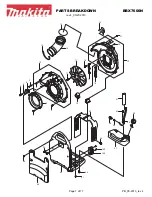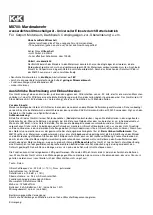
—
8
—
5
Operating instructions
5
.
1
Pre-use checks
Caution!
Before connecting to the circuit to be tested,
carry out the following checks:
Examine the instrument and test leads before use for any sign
of abnormality, damage or contamination. If any abnormal
conditions exist (i.e. broken test leads, cracked insulation or
case, moisture contamination, display faults or inconsistent
readings etc.) do not use the instrument, but rectify the fault
first. Replace defective leads only with the correct types,
or return the instrument for repair. Contact RS Components
for further advice; the address is given at the end of these
instructions.
Connect the test lead to the instrument.
Plug the moulded plug of the mains lead into the socket to be
tested.
Caution!
After connection, ensure the LEDs are as shown
below:
P-E green LED is lit
P-N green LED is lit
Red LED is not lit
If the above sequence is not correct or the red LED is
lit, do not continue the test as the wiring is incorrect.
Investigate and rectify the cause before continuing.
Notes:
Ensure the tested RCD is returned to the original state after
the test.
If a voltage exists between the protective conductor and earth,
it may influence the measurements.
If a voltage exists between neutral and earth, it may influence
the measurements, therefore, the connection between neutral
point of the distribution system and earth should be checked
before testing.
If the fault voltage (Uf) exceeds
50
V AC, the display will indicate
VN-E-Hi , or if the input voltage is greater than
260
V the display
will indicate VP-E Hi . In both cases, testing will be inhibited.
If leakage currents flow in the circuit following the RCD, it may
influence the measurements.
The potential fields of other earthing installations may influence
the measurement.
Special characteristics of RCDs of a particular design (for
example S- type) must be taken into consideration when
carrying out tests.
Equipment with capacitive or inductive characteristics
connected to the circuit protected by the RCD e.g. Motors,
capacitors or transformers, may cause a significant increase
of the measured trip time. Disconnect all such equipment
before testing the RCD.
If the
symbol appears in the display, the internal test
resistor has become too hot and the automatic cut-out circuit
has operated to protect the instrument. Allow the instrument to
cool down before proceeding. When the symbol disappears
from the display, testing may continue.
The earth electrode resistance of a measuring circuit with a
probe shall not exceed
50
Ω
(
20
Ω
at x
5
500
mA only).









































